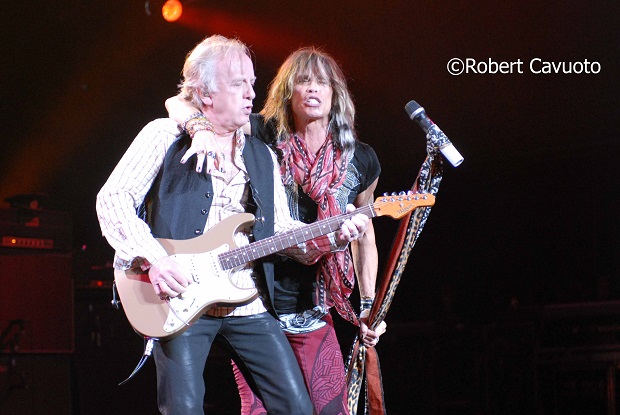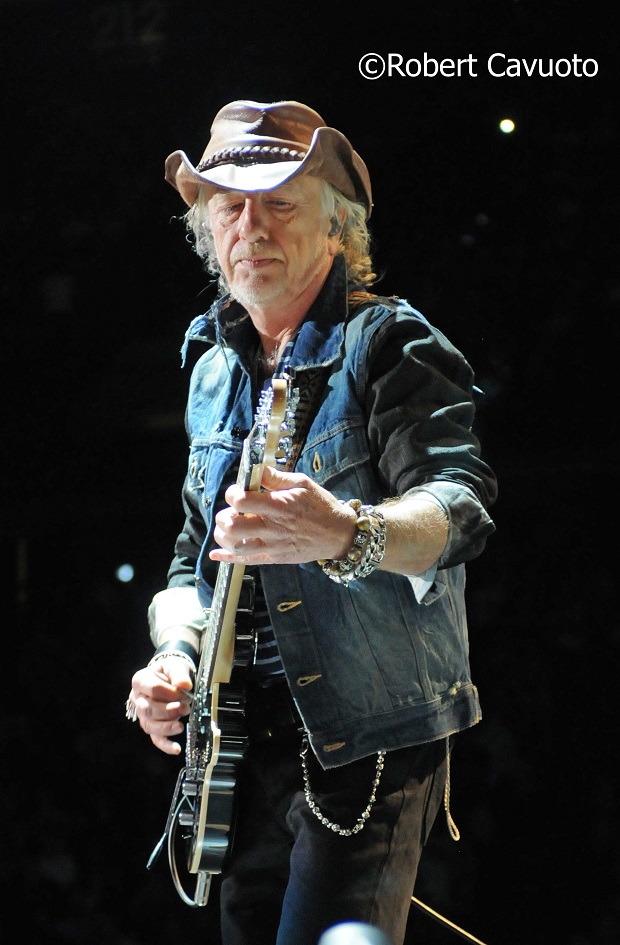By: Rob Cavuoto
Aerosmith are truly one of the great rock acts of all time and this incredible concert film, Rock for the Rising Sun, brings together tracks from across their storied career.
This is the band’s first live video release in nine years, since the You Gotta Move in 2004 and it offers a unique behind the scene look at life on the road with Aerosmith combined with superb live performances from Japan.
Despite advice to the contrary, Aerosmith brought their “Back On The Road” tour to Japan in the fall of 2011 after the country was beset by a huge earthquake, a monstrous tsunami, and the subsequent meltdown of the Fukushima nuclear plant.
A country with which they’d always had a special relationship. The Japanese fans came out in droves and Aerosmith responded with some of the finest shows of their distinguished career.
After seeing the film, legendary Aerosmith producer, Jack Douglas, called this film a “love letter to the Japanese fans.”
The DVD features: “Love In An Elevator,” “Livin’ On The Edge,” “Last Child,” “Walk This Way,” “Draw The Line,” “Sweet Emotion,” “Hangman Jury,” and many more. As bonuses, the DVD includes extra live tracks, “Lick and a Promise” recorded at the Hiroshima Green Garden Arena and “One Way Street” taken from the Tokyo Dome.
I had the pleasure to sit down with Aerosmith guitarist, Brad Whitford, to talk about the importance of the DVD, the evolution of the band, and the next Aerosmith CD.
*****
Robert Cavuoto: The DVD really captured the energy and emotion of the Japanese shows. What were your thoughts when you first saw the video?
Brad Whitford: I lived it, so I kind of knew what we were going to see. The Japanese fans are some of the most unique fans on the planet. It’s always very special to go there and play for them.
We thought this was a very special time, and when the opportunity came up, we thought we owed it to our fans over there, to give them some sort of relief from all the tragedy. It was a great time for us. Hopefully, some of that feeling comes through the DVD.
Robert: It truly does. Was there ever a point where you and the band were concerned about radiation exposure?
Brad Whitford: Certainly, we had our concerns. Anybody would, but I think all the places we went really weren’t subject to much contamination. I guess the thing you worry most about is some of the food and where it came from.
Japanese people thought they’d been lied to about the whole situation. They were, I guess. We were a little apprehensive, but in the end, it’s probably not much more dangerous than anyplace you could go in the world these days.

Robert: You’re probably right about that. Aerosmith is pretty unique in that you change the set list around for almost every show in order to give the fans a better experience. How important is it to you as a performer not to be locked into the same 13 songs every night?
Brad Whitford: Well, it’s great for us and the fans. We like to shake it up a little bit. It puts a different energy to the show, and you have a different mindset when it’s not the same thing every night. Every show, even if you are doing the same material, is different; the energy is different, the combination of performers and audience. Anything else you can do to help bring some new life to it, we always welcome that.
And the other thing is, we have such a body of work to choose from. I mean, we can’t even approach it in two or even three hours. If we did that, we still couldn’t do everything. We have all these songs. We’re like, “Ok, let’s try and break out some stuff maybe we haven’t played in a while.”
In the future, I hope we’ll continue to do that and maybe play some stuff that people haven’t heard in a long time, including us!
Robert: I think most fans like to hear the more obscure songs. I have to imagine the songs from the ‘70s and ‘80s have evolved from the way the band originally recorded them. Do you find that’s the case 30 plus years later?
Brad Whitford: Most definitely. Songs tend to naturally evolve from when we initially did them. We played anywhere and everywhere in the early days. We would often times adapt songs to the live performance and do things in a song that wouldn’t be on a record. Sometimes those changes evolved – they come, they stay, they go. The tempo might change a little bit. A lot of times, things might generally be a little more up-tempo than the original songs. And then, the original track. I might play a kind of a modified guitar part then what I did on the record.
Something that’s more representative of the actual, final mix. So sometimes I might be playing one of the parts of the recording, and then I might be playing something that Joe did on the record, while he’s doing something else. It’s like we listen to a track and trying to make it as close to the original concept. Sometimes we just assign, hey, you do that; I’ll do this. I’ll make it sound like what the final mix is, so whatever it takes.
Robert: We talked a little bit about how some of the songs have changed. How have you seen the band change and evolve from the ‘70s?
Brad Whitford: It’s changed a lot. You know, we’ve all gone through our own personal lives and also through different journeys. I hope we have a much better appreciation that we’re all still the same group of guys doing it, which is pretty much unheard of in that business.
People have to stay inspired. Everybody worked at it more and wants to be a better player. That just benefits the group. Everybody’s musicianship has just continued to blossom. I think there’s a sort of friendly competitive spirit about it in that band. I’m gonna try to knock your socks off.
If I can knock the socks off somebody in my band, I know I’m on the right foot. [Laughter] And I think we all kind of do that a little bit, and it keeps upping the game. It makes for wonderful performances these days. It’s a delight to be part of it.
Robert: Last time you and I spoke, we talked about how long it took to make Music From Another Dimension with all the false starts and stops. Now the big buzz is that Steven Tyler is going to be doing a solo album. Do you see another Aerosmith album in the future?
Brad Whitford: Hmmm. Not a clue.
Robert: I appreciate the honesty.

Brad Whitford: I don’t know what Steven’s waiting for. He’s been talking about a solo album for – I don’t know – 20 years. I don’t know if he needs a permission slip or something. Just go do it; stop talking about it. [Laughter] Nobody cares.
He should go do it and have fun. Go enjoy it. I really don’t know as far as the next Aerosmith album. It could come as a phone call. Next January or February I could get a call from Joe, “Hey, let’s go in the studio.” And it’ll happen like that.
Robert: Are you prepared with new songs if he calls you up?
Brad Whitford: I don’t have a whole lot. But we still have some ideas from our last record. I’ve always got a few things sitting around, but I’d like to approach those things from ground zero and just collaborate.
Robert: I know you’re a big guitar collector. What would be the one guitar that you would grab running out of a burning building?
Brad Whitford: Wow. It’s probably several. I would try and carry more than one out [Laughing]. I’ve got two ’59 Les Paul that it would be an awful pity to lose and then I have a ’54 Strat. It would be just a terrific tossup. I don’t know what I’d do. If I can grab three, I’d probably take the two ‘59s and the ’54 Strat, and stumble my way out of the burning building.
Robert: I know the feeling. I’d be tossing my guitars out the window hoping for the best.
Brad Whitford: Well, if they were Strats, they’d probably survive. If they were Les Pauls, you’d probably have to fix a lot of necks. The one thing about a Strat, it’s almost impossible to break it.
Robert: I spoke to Derek St. Holmes about a year-and-a-half, two years ago. He said you and he were considering doing some work together. Did anything ever come of it?
Brad Whitford: We’re neighbors. We both live in the same town in Tennessee. Yeah, we’re together all the time, and actually I’m probably going to be joining him onstage in a couple of days for a concert here in Nashville. We’re always playing, but we haven’t figured out what it’s going to be yet. I don’t know what we’re waiting for.
Robert: Maybe waiting for Steven’s solo album, right?
Brad Whitford: Maybe you’re right. Maybe it would take Steven saying, “I’m not going to be available for the next eight weeks.” And we’d say, “OK, let’s do it then.” A lot of times it’s scheduling. I’ve got to go off and do these shows, and then all of a sudden, he’s going out with Ted Nugent. We’re both very busy. It’s sometimes hard to get that stretch. You need a chunk of time, where you can go do it.
Robert: Regarding the Songwriter Hall of Fame in New York. How come the whole band wasn’t included with that award?
Brad Whitford: You know what? It never even occurred to me. I never even thought about that, I don’t know. I don’t know the answer to that. I think it was just probably the number of songs and maybe some of the hits they both penned together. But, no, I don’t really know.
I wasn’t even invited, [Laughter]. I’m proud of those guys. I’m glad they got it. It’s a pretty cool thing, but, no. When you listen to some of the stuff that they’ve done over the years, to me it gets more impressive as time goes by.
Robert: Are you going to do the Experience Hendrix Tour again?
Brad Whitford: Well, I try to do it every time, but the last thing I heard was that they’re going to be doing it in October of this year. And I’m pretty sure I’m going to be in South America with Aerosmith. That’s one of the best musical experiences I’ve ever had is going out with that group. We have a great time and I think that just comes across to the people sitting in the audience. Everybody’s having fun.
Craig (10 years ago)
Great Interview Robert.